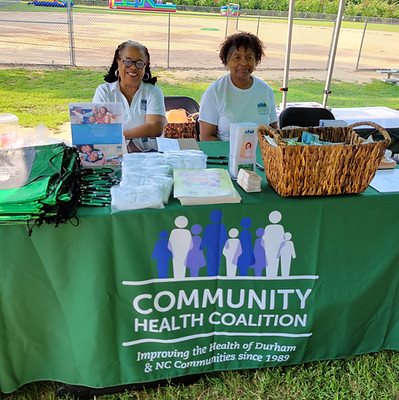Health Awareness & Preventitive Screenings
Our objective is to provide access to preventative care services and health education to the residents of Durham and the surrounding areas.

According to the 2023 Durham County Community Health Assessment, chronic conditions like cancer, diabetes, heart disease, and stroke pose significant health challenges in Durham County. Mortality rates for Black or African Americans are higher than for other racial and ethnic groups for all major causes of death, particularly in cancer and heart disease. Overall, Black, Indigenous, and Latinx individuals are disproportionately impacted by heart disease and stroke. A history of non-consensual medical experimentation on Indigenous and Black communities has led to inadequate healthcare for these populations, causing many to avoid preventive measures and timely medical care, such as screenings. Additionally, racial segregation and redlining have created neighborhoods with limited access to healthy food, physical activity opportunities, educational resources, medical care, and safe housing.
Learn More
2023 Durham County Community Health Assessment
Screenings
CHC nurses and health educators collaborate with public housing residents and seniors to provide screenings and consultations for blood pressure, glucose, and cholesterol levels.
Take Action!
We are looking for volunteers to assist at our health clinics. Local medical professionals encouraged!
Health Education Resources
CHC offers health education resources at events to help individuals manage their conditions, adhere to medication regimens, and enhance their health literacy and lifestyle choices. We provide these services via our Mobile Health Unit, the largest in Durham, containing 2 full exam rooms.
National Public Health Week
NPHW is the first full week of April every year. It's a time to highlight important issues to improve national health and encourage individuals to take action to improve their own health as well as their community. WATCH A VIDEO message from Freda Johnson, Registered Nurse, Durham, NC.
Cancer Prevention & Screening
CHC provides educational and screening events for breast cancer and colorectal cancer.
Contact CHC at 919.470.8680 for more information.
Learn more about screenings and early detection:

Health Education/Health Fairs
Nurses and health educators administer blood pressure and glucose checks, offer consultations, and distribute health education materials on a wide range of health disparity topics.

Health Tips
CHC offers free healthy living tips in collaboration with our partners. They are distributed monthly to local health organizations, community leaders, and churches.

Annual Community May Meeting & Block Party
Our meeting is open to the public, as we recognize community members, highlight accomplishments of CHC, and build awareness of community health care programs and services with an emphasis on chronic disease prevention and healthy lifestyle choices.
Blood Pressure Education /
Hypertension & Diabetes Self-Management Workshops
CHC provides educational events on:
-
how to monitor and manage these chronic conditions
-
exercise, diet, and stress management
-
how to perform CPR
Contact CHC at 919.470.8680 for more information
Lincoln Community Health Center
Free blood pressure class!
First Tuesday of every month, 4:00 - 4:30pm
1301 Fayetteville St, Durham, NC 27707
Downstairs in Conference Room B
Contact marcie.burnette@duke.edu
NC WISEWOMAN
Screening, intervention, counseling and referral services for low-income, underinsured, or uninsured 40- to 64-year-old women.
American Heart Association
Information on healthy living habits, managing blood pressure, learning CPR and more.


CPR Training: 4 Steps to Save a Life from Cardiac Arrest
Dr. Monique Starks, a Duke University Cardiologist, explains how to perform CPR and use an AED (Automated External Defibrillator) to save a life.
Kidney Disease Screening
April 30, 2024 is the first ever APOL1-Mediated Kidney Disease (AMKD) Awareness Day!
Learn More at kidneyfund.org/apol1aware
In the United States, Black people are 4 times more likely to develop kidney failure than white people.
Tips for talking with your doctor about APOL1-mediated
kidney disease (AMKD).
Participate in the CARE Registry Program to get screened APOL1 gene-associated kidney disease and learn about a clinical trial for treatment.




